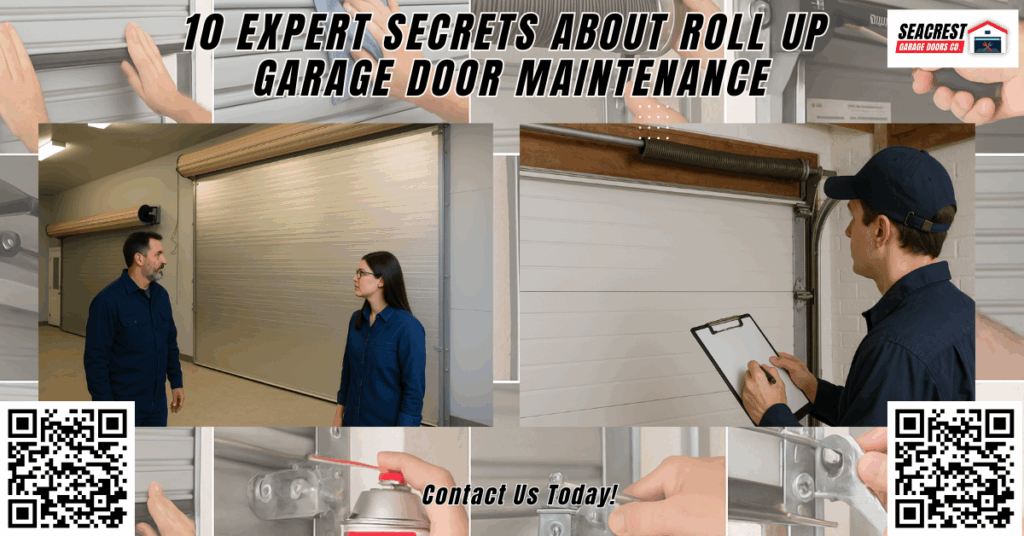Last December, we received a call from Mr. Peterson in Ansonia, CT. He owned a light-duty wooden garage door that warped and jammed after weeks of freezing rain. With no insulation, no wind load certification, and visible damage to the panels and latch, the door no longer met residential standards. After conducting a thorough site check, our technicians at Shelton Garage Door Center recommended a durable steel roll-up garage door with certified wind load resistance and a chain hoist for smooth operation. The installation was completed within days, and the door now withstands both weather and time, proof that quality installation makes all the difference.
If you’re a homeowner or business owner in Connecticut, you might be wondering what it would cost to upgrade to a roll-up garage door. Not only is it a wise investment for protection and property value, but according to national data, replacing a garage door has one of the highest returns on investment in the industry. On average, you can recoup nearly 94.5% of your garage door installation cost when you sell your home or building.
So, how much does a roll-up door cost in Connecticut? Whether you’re looking for a basic sheet door for your backyard shed or a heavy-duty industrial door for commercial field applications, this guide will break down everything you need to know pricing, materials, features, installation process, and more.
What Is a Roll-Up Garage Door?
A roll-up garage door is a vertically operating door system that coils into a compact roll above the door opening. Unlike traditional overhead sectional doors with large panels and rail tracks along the ceiling, roll-up doors use horizontal slats or steel sheets that neatly wrap into a drum using a chain hoist or motorized opener.
There are two main types:
- Rolling Sheet Doors: Typically used in residential or light-duty applications. These use a single steel sheet that rolls up.
- Rolling Slat Doors: Found in commercial or industrial settings, built from interlocking slats offering more strength and better security.
Key features and benefits include:
- Durability: Made with galvanized steel, aluminum, or coated with durable polyester paint for rust resistance.
- Space-saving design: No ceiling rails needed, freeing up overhead space.
- Certified wind load: Some commercial models meet Florida and International Building Code wind load standards.
- Options for insulation, windows, and security devices like camera action devices and safety latches.
Roll-up garage doors are suitable for:
- Residential garages and sheds
- Industrial warehouses
- Commercial storefronts
- Field applications in agriculture and construction
- Storage units and metal buildings
Average Roll-Up Garage Door Cost in Connecticut
The cost of roll-up garage doors varies widely based on size, material, features, and installation complexity. Below is a breakdown based on common garage door models and types:
🔧 Residential Roll-Up Garage Doors
- Basic Steel Models
Cost: $800 – $1,500
Includes a non-insulated rolling sheet door, single color, no windows. Ideal for sheds, small garages, or outbuildings. Common sizes: 8’x7’, 9’x8’. Meets residential standards.
- Insulated Garage Doors
Cost: $1,500 – $2,800
Double-layer steel with polyurethane or polystyrene core. Helps with environmental controls and energy savings in Connecticut’s changing seasons.
- Premium or Custom Models
Cost: $2,800 – $4,500+
Includes added design features, window panels, smart openers, woodgrain finishes, or specialty colors. Matches a wide range of aesthetic preferences.
🏢 Commercial Roll-Up Garage Doors
- Light-Duty Commercial Doors
Cost: $1,200 – $3,000
Single-layer steel with basic features. Good for storage facilities or shops with limited usage.
- Heavy-Duty Industrial Doors
Cost: $3,000 – $7,000+
Includes high-cycle use models, wind-rated construction, slat doors, and cam action locks. Common in warehouses and manufacturing plants.
Note: Costs may increase for large square foot openings, high-speed operation, or premium brand selections like Amarr or Janus model features.
Factors That Influence Roll-Up Garage Door Pricing
1. Size and Series
Larger doors or custom sizes increase cost. Common commercial sizes include 10’x10’, 12’x14’, or 14’x16’. Door series (economy vs. high-performance) also affects pricing.
2. Material and Durability
- Steel doors offer top durability and are often galvanized for longevity.
- Aluminum doors are lighter and rust-resistant but cost more.
- Heavy-duty and industrial door options feature enhanced resistance to corrosion, impact, and wear.
3. Insulation and Environmental Controls
Insulated doors help regulate internal temperature and reduce heating costs. Look for high R-values, especially in buildings with masonry walls or energy code requirements.
4. Operation Method
- Manual chain hoist systems are cheaper but require more effort.
- Motorized systems with remote controls, Wi-Fi apps, and safety sensors raise costs by $300–$700+.
- Look for easy adjustment and safety latch mechanisms as added features.
5. Installation Complexity
- Replacing old doors or making structural changes increases labor.
- Commercial buildings may require building code checks, wind load certification, or site inspections before installation.
At Shelton Garage Door Center, we conduct a complete site check, ensure compatibility with local code, and assist with permit acquisition when needed.
Additional Cost Considerations
- Building Permits: May cost $50–$150, depending on your town’s code.
- Smart Control Upgrades: Add $150–$400 for app integration and smart openers.
- Color and Panel Options: Custom available colors or available panels (like windows) can raise the price.
- Annual Maintenance: $100–$250 for inspections, spring tension checks, and lubrication.
- Shipping Costs: Some garage door models come with added shipping fees, especially for large commercial addresses or remote sites.
Why Roll-Up Garage Doors Are a Smart Investment
Choosing a roll-up door isn’t just about function, it’s about long-term performance and savings. Here’s why Connecticut property owners are choosing them more and more:
- Certified wind load resistance protects against storm damage.
- Steel doors meet or exceed most building codes for strength and fire rating.
- Low-maintenance product design reduces annual upkeep and repairs.
- Wide range of applications from sheds to warehouses.
- Quick installation means less downtime for your home or business.
Whether you’re upgrading a garage in Stratford or installing a roll-up door for your commercial site in Derby, it’s a secure, cost-effective option for any structure.
Why Choose Shelton Garage Door Center?
Located in the heart of Shelton, CT, we’re proud to serve homeowners and business owners across New Haven and Fairfield Counties. With years of field experience, our certified installers are trained to meet residential and commercial standards with precision.
We specialize in:
- Garage door installations for all property types
- Roll-up door replacements and custom design builds
- Heavy-duty commercial roll doors
- Chain hoist systems, cam action lock installations, and wind load certifications
- Garage door maintenance and annual inspections
Our partnerships with brands like Mueller, Amarr, and Janus ensure you receive only top-tier products with reliable 10-year warranties and code compliance.
📞 How Can Shelton Garage Door Center Help You?
If you’re ready to replace your old garage door or need a new installation for your business or shed, Shelton Garage Door Center is here to help. From rolling sheet doors for light use to industrial steel models with high wind load ratings, we offer a wide range of garage door options tailored to your needs.
✔ Free site check & estimate
✔ Local expertise in building codes and weatherproofing
✔ Fast turnaround (usually within weeks)
✔ Flexible pricing and maintenance packages
✔ 100% satisfaction guarantee
📍 Visit us at: 20 Waterview Dr, Shelton, CT 06484
📞 Call now: (203) 718-5976
🛠️ Let’s roll up a better door for your property—contact us today!
Frequently Asked Questions (FAQs)
1. How long does a roll-up garage door typically last in Connecticut weather?
With proper maintenance, most roll-up garage doors last 20–30 years, especially if made from galvanized steel and installed to code.
2. Can roll-up doors be installed in sheds or barns?
Yes, roll-up doors are ideal for sheds, barns, and outbuildings due to their space-saving operation and wide range of size options.
3. Are roll-up doors safe for residential garages with kids or pets?
Modern roll-up garage doors can include sensors, manual locks, and smart openers that enhance safety for families.
4. What’s the difference between slat doors and sheet roll-up doors?
Slat doors use individual metal slats and offer more durability, while sheet doors use a single rolled sheet and are best for lighter-duty applications.

